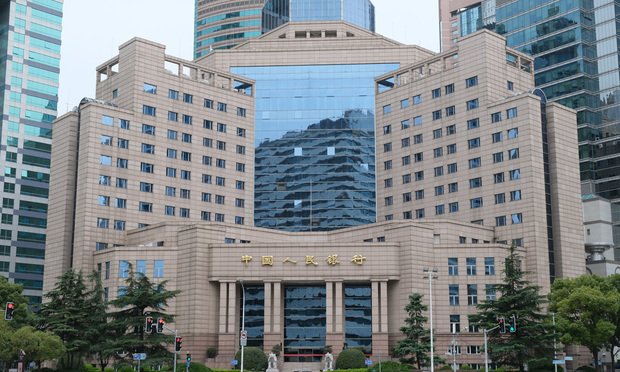- Banking and Finance Laws
- China Law News
- Cybersecurity
- Foreign Direct Investment
- Projects Energy and Environment
In the News: 'Reverse CFIUS' Will Not Apply Retroactively; PBOC Drafts Rules on Data Security; and China Encourages Private Investment in Projects
July 26, 2023 | BY
Brian ChanPresident Joe Biden's much-anticipated "Reverse CFIUS" executive order, which will require the screening of U.S. investments into China, will not apply retroactively, at least initially; The PBOC drafts rules on data security for its own business areas; and China aims to inject private captial into national infrastructure projects.
Shanghai,China-March 25th 2023: facade of People's Bank of China (PBC). The central bank of China. Credit: Robert/Adobe Stock
Outbound Investment Regulations Will Not be Retrospective
The Biden Administration's long-anticipated executive order referred to as "Reverse CFIUS," which will create the first national security screening of U.S. investments into China, will not apply retroactively, according to a report by The Deal. The order will not undo transactions agreed upon before it is issued, but it could undo American investments in Chinese companies and startups that close after the White House unveils the new regulation, which could happen later this summer or in the fall. President Biden is expected to invoke the International Emergency Economic Powers Act (IEEPA) as the supporting legal authority to issue the executive order.
The Treasury is likely to take the lead on "Reverse CFIUS" because of its experience with CFIUS, the acronym for the Committee on Foreign Investment in the U.S., and for the role it plays with sanctions and in the development of an outbound investment review scheme. The main target of the order will be investments in innovations with military applications, including technology transfer, intellectual property and management expertise. The "Reverse CFIUS" order would allow the government to block transactions and collect data on investments into China that could raise national security issues. The White House directive is set to be released as Congress considers legislation to establish an outbound investment regimen. Once regulations are in place for the outbound screening, joint ventures, private equity, venture capital and other transactions that are not yet completed could be undone. The rationale behind the new regulations is to safeguard America's leadership on cutting-edge technologies such as semiconductors, artificial intelligence and quantum computing.
This premium content is reserved for
China Law & Practice Subscribers.
A Premium Subscription Provides:
- A database of over 3,000 essential documents including key PRC legislation translated into English
- A choice of newsletters to alert you to changes affecting your business including sector specific updates
- Premium access to the mobile optimized site for timely analysis that guides you through China's ever-changing business environment
Already a subscriber? Log In Now





